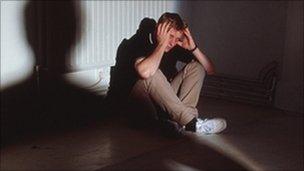Women's convictions for domestic violence 'double'
- Published
- comments

Some experts think male victims of domestic violence are now more likely to report it to police
The number of women convicted of domestic violence in England and Wales has more than doubled in the past five years, an investigation by BBC Radio 5 live Breakfast has found.
Figures obtained from the Crown Prosecution Service showed that almost 4,000 women were successfully prosecuted in the past year, compared with 1,500 women in 2005, a 169% increase.
Some experts say it is a worrying sign of the growing culture of violence among women, while others believe that men are now more likely to report that they have been beaten up by their wives and girlfriends than in previous years.
Chief Constable Carmel Napier, the Association of Chief Police Officers' lead on domestic abuse, says the figures show there is wider reporting of domestic abuse.
"We know about more cases now because of better responses from police, multi-agencies and the voluntary sector and a shift in the societal view of the crime," she says.
Peter says he was physically and emotionally abused by his wife for almost a year.
But after finally calling the police, he could not bring himself to press charges.
He had to sleep for months lying in the same position, on his back. If he turned his back his wife would punch and kick him.
Peter says the first incident of violence took him completely by surprise.
"I wasn't expecting the punch on the face. I wasn't expecting somebody hitting me so fast.
"You know when you love someone so much and you just believe they can just change? I was hoping she would change," he says.
Kieron was stabbed in the chest by his ex-wife. She is now serving a four-and-a-half year prison sentence.
He says the abuse started during her pregnancy.
The night he was stabbed, Kieron's wife came home from a friend's house demanding he cook her something to eat.
They got into an argument and she threatened to punch him, but when he pushed her away she went into the kitchen and grabbed a steak knife and plunged it into Kieron's chest.
"I could see the blood coming through the T-shirt.
"All the time I was on the phone to the ambulance I was in and out of consciousness.
"All I remember is that the ambulance people were there giving me oxygen and pain relief. The doctors gave me a 50-50 chance whether I was going to live or die," he says.
'Decades behind'
It is unclear why the conviction rates for women committing domestic violence are increasing, but organisations that offer help to male victims are sparse.
One charity that does is Mankind, which says there are just over 70 bed spaces in 20 refuges or safe houses for male victims in the UK, compared with 7,500 for women.
Mankind's chairman, Mark Brooks, believes that despite the number of women being convicted, some organisations still fail to recognise that men can be victims of domestic abuse too.
"There are a number of national and local helplines. There are some councils and police forces that do a great job in encouraging and supporting men when they come forward, but it's far too few," says Mark.
He believes that services are around three decades behind those available to female victims.
"Really in this day and age that is not acceptable," he says.
The Crown Prosecution Service says any form of domestic violence is a serious crime irrespective of whether the victim is male or female - and that there is no bias or lack of concern when dealing with cases of male victims.
Men, though, remain by far the main offenders, with the numbers convicted increasing from more than 28,000 in 2005 to just over 55,000 in 2010.
Hear the full report on 5 live Breakfast with Rachel Burden and Nicky Campbell on BBC Radio 5 live on Monday 6 June 2010 between 0600 BST and 0900 BST.
- Published28 April 2011
- Published9 February 2011
- Published10 January 2011